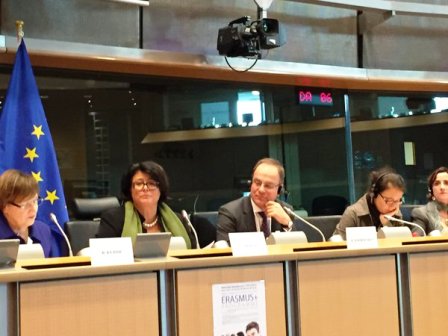At an EPP Group Hearing yesterday on the implementation of the Erasmus+ Programme, European Commissioner Navracsics and MEPs discussed with national experts whether the programme has achieved its aims and whether there are practical problems in terms of implementation, following a bottom-up-approach. Erasmus+ is the new EU programme for education, training, youth and sport, bringing together seven existing programmes and providing support for sport for the first time. The aim of Erasmus+ was to provide more opportunities for cooperation across the different sectors and to make access to funding easier with simplified funding rules. For Sabine Verheyen, EPP Group Spokeswoman in the Culture and Education Committee, Erasmus+ is one of the best opportunities for young people to live the European idea, to get to know other countries and cultures.
In his introductory speech Commissioner Navracsics explained the history, the goals and the activities of the Erasmus+ Programme highlighting the European Parliament as a vital supporter of the programme and essential partner in ensuring it is implemented well. He said that we can do still better (improving IT tools and cutting red tape) considering that we have not seen yet much of an impact of the 40% budgetary increase on the projects selections, although it will start to be seen in 2016 and will become more visible in 2017. Implementing the programme is still too complex and it needs to be simplified. This is a priority for the European Commission.

Commissioner continued his intervention by referring to the very good results of Erasmus+ namely the international credit mobility and the master loan guarantee facility. Erasmus+ is now fully operational. It has already supported more than one million students, apprentices, other young people as well as teachers and trainers going abroad, and it has funded more than 30,000 mobility and partnership projects for education training and youth.
For Commissioner, Erasmus+ is much more than a popular flagship programme that allows EU citizens, particularly younger ones, to gain experience abroad. Erasmus+ is an essential tool for shaping the European society of today and tomorrow and it lives up to its motto of “changing lives and opening minds“: It brings people from different backgrounds together, fostering dialogue, mutual understanding and tolerance. And it is a programme we have to use strategically, today more than ever.
He pointed out that inclusive education is an indispensable and essential part of the solution to these major societal challenges and will also have a crucial role in integrating the refugees and migrants coming to Europe. This is why he has proposed to use all the legal and budget flexibility we have to focus on social inclusion in the Erasmus+ work plan for 2016.
Mr Navracsics stated that the famous “Erasmus+ spirit” is much needed at a time when our Union is facing severe challenges that are affecting the cohesion of our society, while he is truly convinced that Erasmus+ can help us to make a difference both in individuals’ lives and in our society as a whole.

He urged to build on what we have achieved and be even more ambitious for the years ahead and continued by looking ahead to the second half of Erasmus+. The mid-term review of the multiannual financial framework will take place in 2016. This is an important opportunity for the EU to adjust its budget to the emerging political priorities.
“You can count on me to defend and promote Erasmus+ as a clear priority in this strategic review”, concluded the Commissioner.
